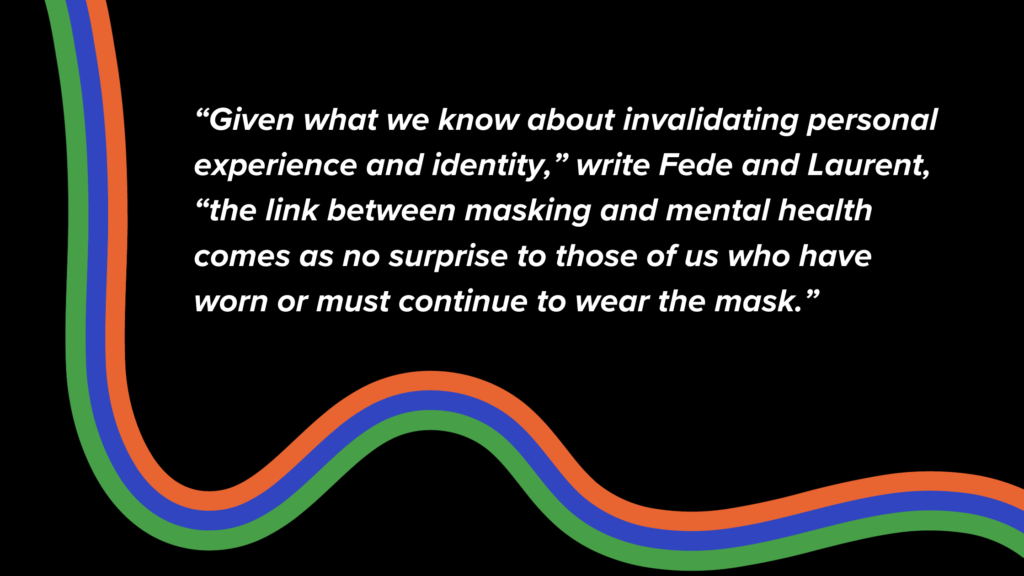Unmasking in Tech: Embracing and Empowering Your Authentic Self Toolkit
Written by Manda Frederick

As technology evolves, diverse technologists bring unique perspectives critical to fostering innovation and progress. However, you may be in situations where you don’t feel your diversity is honored or celebrated. This might cause you — consciously or unconsciously — to hide your authentic self behind a metaphorical mask, especially in the workplace.
Much of what we know about masking today comes from research about persons with Autism, with individuals sharing their experiences with masking. Related research shows that masking is amplified in marginalized groups, with women, people of color, and LGBTQ+ possibly feeling an even greater need to hide their disabilities.
While masking can help you navigate complex situations and feel safer, whether you are doing so intentionally or not, it’s important to understand that there are possible negative consequences.
This toolkit aims to support you on this journey to being your authentic self as a diverse technologist to thrive wholly as you are in your career.
🎧 This toolkit is a companion to our recent WWCode Podcast episode on masking, where some of Team Teal discuss their unmasking journeys and tips for navigating it. Listen now.
Masks and the Damage They Do
Masking, at its core, involves suppressing certain aspects of your identity, experience or difficulties to fit into a particular mold or to be accepted within a given context. Masking may be conscious or unconscious, meaning a person may actively and intentionally camouflage parts of their experience or identity; however, some people may realize they have been masking without knowing — after they receive a late diagnosis of Autism or ADHD. Those who mask, consciously or unconsciously, may often do so from fear of judgment, discrimination, or exclusion. In your professional life, you might worry if your colleagues or manager see the “real” you, they may doubt your ability to perform your work, be a good team member, or advance in your career.
In tech, as a diverse technologist, you may mask to protect yourself from unconscious bias, discrimination, or workplace stereotypes related to gender, race, cognitive differences (e.g., neurodiversity), ableism, and stigma related to mental health.
Know that masking (also known as “camouflaging”) is very normal. But being common doesn’t make something healthy. Our brains are beautiful machines, but they aren’t meant to manage the complexity of helping us be something we aren’t.
“[Masking] takes constant vigilance, control and effort and it is not only exhausting, but extremely damaging,” write Jacquelyn Fede and Amy Laurent in 2019 article. “It wears you down and drains your cognitive energy and resources; it makes you feel physically weak and exhausted; and it reinforces to you that you cannot be you; that your natural ways are not acceptable and that the world would rather suck the life out of you each day than experience your authentic self, which might be the most damaging of all.”
Studies have shown that masking can increase mental health issues and stress, and especially for autistic people, long-term masking increases the risk of suicidal thoughts and behaviors.
You may also experience:
- Burnout: Constantly suppressing one’s identity is emotionally and mentally exhausting, as Fede and Laurent state.
- Inauthenticity: Masking can lead to disconnection from one’s true self, creating confusion in your career journey or how you relate to your community and colleagues.
- Missed Opportunities: When individuals don’t express their unique perspectives, innovation and creativity are stifled — and the entire tech community suffers from this loss.

Tools for Unmasking
Strategies
Unmasking is about embracing your authentic self, reclaiming your identity, and bringing your unique perspective to the tech world. Here are some strategies to help you unmask:
- Acknowledge Your Unique Strengths: Recognize the value of your diverse perspectives and experiences to your community, workplace, and community.
- Seek Supportive Communities: Connect with like-minded individuals and support networks who understand your journey and can offer guidance.
- Share Your Experience: To the level you feel comfortable, sharing your experience with friends, colleagues, or your company’s leadership can help others understand better how to support you and allow you to ask for any accommodations you may need.
- Self-Care: Prioritize self-care, mental health, seeking medical or therapeutic assistance if needed, and your well-being to help alleviate the emotional strain of masking and receive medical care if needed.
Resources for Authenticity and Embracing Diversity
On Authenticity
- 📘The Authenticity Principle: Resist Conformity, Embrace Differences, and Transform How You Live, Work, and Lead by Ritu Bhasin
- 📘19 Masks People Wear: How to See Beyond the Masks; Exploring Emotions and Identity as a Path to Self-Discovery, Strengthening Communication and Inner Fulfillment by Brian Basterfield
- 📘Your Authentic Self: Be Yourself at Work by Ric Giardina
- 📘Whistling Vivaldi: How Stereotypes Affect Us and What We Can Do by Claude M. Steele
- 🎧 Authentic Self Podcast
On Diversity, Equity and Inclusion
- 📘The Power of Neurodiversity: Unleashing the Advantages of Your Differently Wired Brain by Thomas Armstrong
- 📘The 4 Stages of Psychological Safety: Defining the Path to Inclusion and Innovation by Timothy R. Clark
- 📘Inclusion on Purpose: An Intersectional Approach to Creating a Culture of Belonging at Work by Ruchika Tulshyan and Ijeoma Oluo
- 🎧 Women Who Code DEI On-Demand Library
Unmasking is an empowering journey toward embracing your identity and contributing your talents to the tech industry. By unmasking, you uplift yourself and create a path for a more diverse, inclusive, and innovative world.